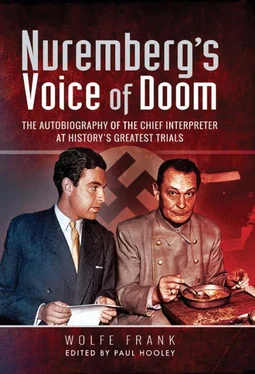My first experience as an interpreter at an interrogation came whilst I was still at Oeynhausen. I had met Colonel Gerald Draper in the officer’s mess. He was clearly very sick (he had tuberculosis, I later discovered) and he had the air of a man who had something to take care of before it was too late.
Draper, who had been a barrister before the war, belonged to the Judge Advocate’s Office and had been assigned to the case of one Dr Bruno Tesch, now in custody, who had been one of the two owners of a Company called Tesch & Stabenow in Hamburg. They were manufacturers of a gas called ‘Zyklon B’ (or Cyclone B) – which was used to exterminate the inmates of Hitler’s death camps. Tesch was to be tried for his contribution to this, the most heinous crime in modern history. However, there was another side to our investigation. The Russians had requested Tesch’s extradition and had filed a prima facie case.
This led to a very subtle consideration. If Tesch was to be found guilty by the British, he could be condemned to death and executed. The Russians had abolished the death penalty and would, it seemed, in all probability sentence him to life imprisonment – obviously a fate worse than death.
I must admit that Draper and I, together with another interpreter and a sergeant, were not overly gentle with Tesch. He was a repulsive type. He was heavy set, dressed in an expensive suit, a little the worse for wear after some months in jail, and sure of himself to the extent of being conceited.
We had a lot of documents showing him as visiting the camps and letters from Himmler, [2] Heinrich Luitpold Himmler (1900-1945) was Reichsfuehrer (Commander) of the SS and a leading member of the Nazi Party. Hitler appointed him a military commander and later Commander and administrator of the entire Third Reich. Himmler was one of the most powerful men in Nazi Germany and one of the people most directly responsible for the Holocaust. He was arrested by the British at the end of the war and committed suicide in May 1945.
asking for adequate supplies of Zyklon B so that the ‘ Ungezieferbekampfung ’ – the vermin extermination – could be carried out expeditiously. There were also letters from Tesch to the RSHA containing good advice as to how blankets could be used to make gas chambers airtight – to exterminate the vermin in them, of course.
We started the interrogation at 06.00 hours and Draper kept at Tesch for eight uninterrupted hours, with me as the interpreter. Tesch was given water to drink but no food. At 20.00 hours in the evening, Draper had himself replaced by his colleague, again with me as the interpreter. We kept going until 04.00 hours the following morning, then we went to bed, while Tesch was kept awake, sweeping his cell and working in the kitchen.
The interrogation was resumed at 06.00 hours. Draper was back, and he stayed on the job until 05.00 the following morning, when Tesch confessed.
We hadn’t touched him, but there was a glaringly bright light on him throughout. Only once, when he nodded off during the second night, had the sergeant thrown a mug of tea in his face. Apart from that we had mollycoddled him compared to what Gestapo would have done to him had they been in our place.
Tesch confessed that Zyklon B had been developed to kill people. He knew who he was helping to kill and he saw it done. He also assisted Otto Ohlendorff, of whom we will hear later, in designing the mobile gas chambers used in Eastern Europe.
We just sat there after these admissions had poured out of the prisoner. We were dazed, drained and nauseated. I informed Tesch that his confession would be typed up and that he would be asked to sign it. He nodded, slowly and rose to be returned to his cell.
Gerald Draper covered his face with his hands. He was sobbing.
After some minutes he thanked me for my help. I had done much more than interpret questions and answers since I was now a member of the interrogation team, sensing the moments when the pressure needed to be applied, or when understanding needed to be displayed. I had been rather effective.
As Draper and I were walking back towards our billets he told me the reason for his emotional outburst. He had been engaged to an Austrian Jewess who had been killed in a camp where Zyklon B was being used.
Shortly before I left Oeynhausen Draper asked me to accompany him to the camp where Tesch was being kept. A decision had been sent to Draper from London to the effect that the Russian request for the extradition of Tesch had been granted. I read the text to him in German. He broke down completely. We left the room while he was still jabbering disjointed pleas for a change of this dreadful decision.

25. A DEAL WITH DIELS
ON MY WAY OUT OF THE CAMP I encountered the captain who was the official interpreter. He told me he had heard I would soon be going to Nuremberg. He then informed me that they had a man in camp who might be of interest, not only to me, but as a witness for the prosecution at Nuremberg. The captain knew this man to be a relative of Goering and that he had been a high-ranking officer in the Gestapo. He said he would send the man over, if I was interested.
That is how I came to meet Dr Rudolf Diels, one of the most fascinating men I had ever encountered. He was brought into an interrogation by the Camp Interrogator who then left us alone. I took a look at my new customer. He was tall, very dark haired and had heavy duelling scars on his face (see Chapter 13, Note 2). He was extremely intelligent and spoke beautiful cultured German. He was also emaciated, dreadfully nervous whilst being sure of himself, and he was courteous without being servile or afraid. His face showed the weariness he expected from yet another interrogation.
I told him who I was and that I would be involved in the trial of Goering and the other top Nazis, and I asked whether he might have anything pertinent to contribute to the picture we would be developing of them. He said he did have. He wasn’t suggesting that he would be of considerable value to us at Nuremberg. He merely, in a few sentences, gave an outline of his activities in the Third Reich, which were as follows:
He was married to a cousin of Goering and he had been Chief of the Prussian Gestapo at the time of van der Lubbe’s burning down of the German Reichstag. [1] Marinus van der Lubbe (1909-1934), a Dutchman, was tried, convicted and executed for setting fire to the Reichstag building in Berlin on 27 February 1933, an event that became known as the Reichstag fire.
He had been Chief of the Shipping Division of the Hermann Goering Works (a national industrial unit engaged in a multitude of economic and production activities) and also Lieutenant Governor of the City of Hanover. He had been denounced as having been involved in the 20 July 1944 plot against Hitler [2] On 20 July 1944, Claus von Stauffenberg and others attempted to assassinate Adolf Hitler in his field headquarters near Rastenburg, East Prussia.
but had been spared execution following Goering’s intervention. Instead he had been sent to the Russian Front as a private in a ‘ Strafkompagnie ’ (penal company) where he ought to have been killed. He had however escaped to the West and had been captured by the British.
This potted history was delivered in the briefest of terms and in less than five minutes. I could not detect any improbabilities or any attempt to promote my sympathy or compassion. I decided that I would hang on to Diels. The question was – how? I asked my friend the interpreter.
Читать дальше













